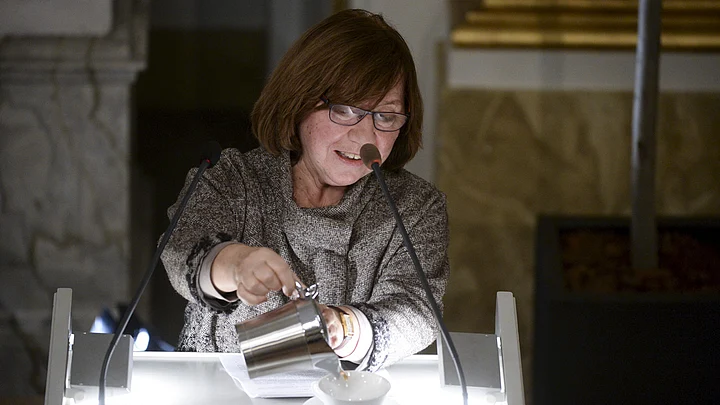I am drawn to that small space called a human being… a single individual. In reality, that is where everything happens. I’m interested in the history of the soul. The everyday life of the soul, the things that the big picture of history usually omits, or disdains. I work with missing history.
And that, essentially, is why this year’s Nobel Prize for Literature was awarded to investigative journalist and non-fiction prose writer, Belarus’s Svetlana Alexievich. In her acceptance speech, titled ‘On the Battle Lost’, at a ceremony in Stockholm, Alexievich paid an elegiac tribute to her people’s history of war, loss and disillusionment, and the crumbling of the post-Soviet dream of hope.
On Why Her Journalistic Work Qualifies as Literature
What is literature today? Who can answer that question? We live faster than ever before. Content ruptures form. Breaks and changes it. Everything overflows its banks: music, painting – even words in documents escape the boundaries of the document. There are no borders between fact and fabrication, one flows into the other.
Love in the Time of War
I don’t remember men in our village after World War II; during the war, one out of four Belarusians perished, either fighting at the front or with the partisans. After the war, we children lived in a world of women. What I remember most, is that women talked about love, not death. They would tell stories about saying goodbye to the men they loved the day before they went to war, they would talk about waiting for them, and how they were still waiting. Years had passed, but they continued to wait: “I don’t care if he lost his arms and legs, I’ll carry him.” No arms… no legs… I think I’ve known what love is since childhood…
The Red of the Soviet Empire Runs Deep; It Has Consumed the Past...
I have written five books, but I feel that they are all one book. A book about the history of a utopia... the history of how people wanted to build the Heavenly Kingdom on earth. Paradise! The City of the Sun! In the end, all that remained was a sea of blood, millions of ruined human lives... The collapse of the empire upset everyone. People were worried about everyday life. How and with what to buy things? How to survive? What to believe in? What banners to follow this time? Or do we need to learn to live without any great idea? The latter was unfamiliar, too, since no one had ever lived that way...[We] had never been so alone as in those first days of freedom.
...And Stained the Present
...[In 1990s] the question was posed: what kind of country should we have? A strong country, or a worthy one where people can live decently? We chose the former – a strong country. Once again we are living in an era of power. Russians are fighting Ukrainians. Their brothers. My father is Belarusian, my mother, Ukrainian. That’s the way it is for many people. Russian planes are bombing Syria ...a time full of hope has been replaced by a time of fear. The era has turned around and headed back in time.
“We Are Two Creatures Who Have Met in Boundless Infinity…”: The Importance of Stories, Conversations
In my books...people tell their own, little histories, and big history is told along the way. We haven’t had time to comprehend what already has and is still happening to us, we just need to say it. To begin with, we must at least articulate what happened. We are afraid of doing that, we’re not up to coping with our past.
Alexievich’s all-consuming interest in oral narratives of all sorts is what ultimately sets her apart and gives her work its complexity. The stories that people tell – anecdotes to pass the time, confessions of grief and loss, jokes shared in the face of gunfire, fond childhood remembrances – this is what captures the truth of difficult human experiences for Alexievich. It is this fidelity to the individual lived experience that makes it impossible for her to tie her speech with a neat bow, end on a conventional note of optimism or good cheer, and so she says:
I have three homes: my Belarusian land, the homeland of my father, where I have lived my whole life; Ukraine, the homeland of my mother, where I was born; and Russia’s great culture, without which I cannot imagine myself. All are very dear to me. But in this day and age it is difficult to talk about love.
